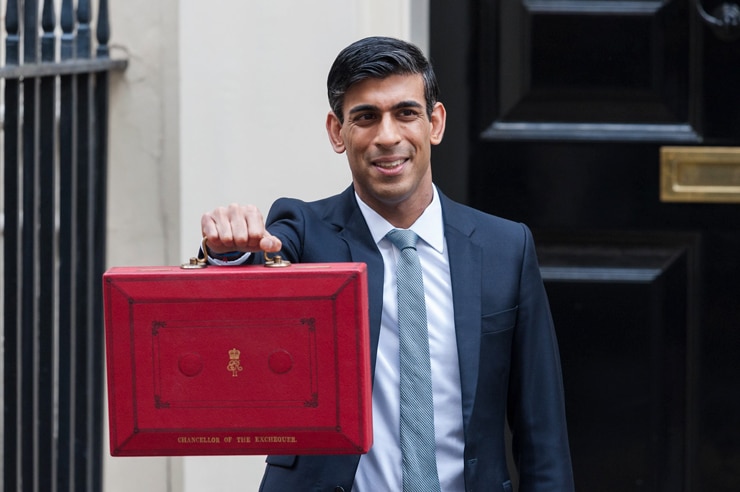Budget 2021: Furlough & Self-employed Support Extended
06/03/2021 - 10 minutes readFurlough Extension
As part of the Budget 2021 announcement, Chancellor Sunak has extended the furlough scheme (CJRS) to 30 September 2021, but support will tail off after 30 June.

The eligibility for the scheme has also been amended to include, from 1 May 2021 onwards newly eligible employees who were employed on 2 March 2021, as long as a payment of earnings was reported on RTI between 20 March 2020 and 2 March 2021.
| Furlough periods within: | 1–31 Oct 2020 | 1 Nov to 30 June 2021 | 1–31 July 2021 | 1 August–30 September 2021 |
| Employee wages covered by grant | 60% of usual | 80% of usual | 70% of usual | 60% of usual |
| Maximum wages per month covered by grant | £1,875 | £2,500 | £2,187.50 | £1,875 |
| Employer NIC covered by grant? | No | No | No | No |
| Employer pension contributions covered by grant? | No | No | No | No |
| Employer must pay amount of furlough wages per month: | 20% of usual up to £625 | – | 10% of usual up to £312.50 | 20% of usual up to £625 |
| Employee should receive at least per month for furloughed periods | 80% of usual up to £2,500 | 80% of usual up to £2,500 | 80% of usual up to £2,500 | 80% of usual up to £2,500 |
In an announcement that will send a powerful message to compliant employers, as well as a warning shot to fraudsters, HMRC will be recruiting an additional 1,265 staff to investigate CJRS fraud and error.

Budget 2021 summary
Corporation Tax
Legislation will be introduced in Finance Bill 2021 to set the charge to Corporation Tax and set the main rate of Corporation Tax for all non-ring fence profits to 19% for Financial Year 2022 and to set the charge to Corporation Tax and set the main rate at 25% for Financial Year 2023.
Legislation will also introduce a small profits rate and will set this at 19%. The small profits rate will apply to profits below the lower limit of £50,000 and profits exceeding the upper limit of £250,000 will be charged at the main rate.
Marginal relief provisions will also be introduced so that, where a company’s profits fall between the lower and upper limits, it will be able to claim an amount of marginal relief that bridges the gap between the lower and upper limits providing a gradual increase in the Corporation Tax rate.
The lower and upper limits will be proportionately reduced for short accounting periods and where there are associated companies.
130% First-year Capital Allowance
From 1 April 2021 until 31 March 2023, companies investing in qualifying new plant and machinery assets will benefit from a 130% first-year capital allowance. This upfront super-deduction will allow companies to cut their tax bill by up to 25p for every £1 they invest.
Investing companies will also benefit from a 50% first-year allowance for qualifying special rate (including long life) assets.
Tax and Pension Allowances & NI Thresholds
The planned increases in the personal allowance to £12,570 and the 20% tax band will remain but then be frozen until 5 April 2026.
This is a huge relief operationally for both HMRC and employers, given that all the PAYE tax codes for 2021/22 have now been issued and payroll software updated to apply the personal allowance increases to suffix codes L, M and N. It is testament to the successful lobbying by representative bodies across the accounting and software industries.
National Minimum Wage Rises
The previously announced rises will go ahead for the first pay period that begins on, or after, 1 April, so the week commencing 5 April for weekly paid employees.
As the highest rate drops to age 23 from 25, employers will need to take care that there is still headroom for salary sacrifices such as pensions to be operated without pay dropping below NMW.
The government’s target is for the top rate of National Living Wage to be two thirds of median earnings, and extended to those aged 21 and over, by 2024.
Apprenticeships
The one-off payment for employers in England who hire apprentices of any age will be increased to £3,000. Skills funding is a devolved matter so it is for the other administrations to make decisions whether to replicate this.
Portable apprenticeships across multiple consecutive employers will be introduced from the summer of 2021.
Benefit in Kind Easements
Two of the benefit in kind easements relating to COVID-19 will be extended for 2021/22:
- – The provision by employers, or reimbursement to employees, of antigen tests, and
- – The reimbursement of expenses covering the cost of home office equipment
Fuel Benefit and Company Car Charges
These were announced in February and will rise by CPI. The legislation will be laid this month and tax codes issued to be effective from 6 April 2021. Company car benefit in kind values can be seen here.
Self-employed: Two Further SEISS Grants
The government confirmed that the fourth SEISS grant will be worth 80% of three months’ average trading profits, paid out in a single instalment and capped at £7,500 in total. The grant will cover the period from February to April 2021 and can be claimed from late April.
Self-employed individuals must have filed a 2019-20 Self-Assessment tax return to be eligible for the fourth grant. This means that over 600,000 individuals may be newly eligible for SEISS, including many new to self-employment in 2019-20. All other eligibility criteria will remain the same as the third grant. Further details will be published in due course.
The portal to apply for this grant will be open from late April to 31 May 2021.
Business Rates Holiday Extended Until June 2021
While other Covid support measures will continue until September, the rates holiday will go through a transitional period from July until the end of March 2022 when businesses will get 66% relief.
The amount that a business can receive will be capped at £2m for properties that had to be closed on 5 January 2021, or £105,000 per business for other eligible properties.
A New ‘Restart’ Grant Replaces the Currently Monthly Grant
As non-essential retail opens earlier, grants to those businesses will be worth up to £6,000. With hospitality opening later, individual businesses could receive as much as £18,000. The new ‘restart’ grant will be paid to businesses directly by your local authority from April and it replaces the currently monthly grant.
Recovery Loan Scheme Replaces CIBLS, CLBLS & BBLS
From 6 April 2021, the government’s Recovery Loan Scheme will replace CIBLS, CLBLS and BBLS which all end on 31 March. The new scheme will provide lenders with a guarantee of 80% on eligible loans between £25,000 and £10m.
Four VAT Rates to Grapple With
For the first time since 1979, the UK will have four rates of VAT for the six-month window starting on 1 October: 0%, 5%, 12.5%, 20% as the new rate of VAT for the tourist and hospitality industry will be 12.5% from 1 October 2021 to 31 March 2022.
Until 30 September 2021, the temporary 5% rate will be maintained. It was due to revert to 20% from 1 April 2021.
The industry will be pleased with the six-month extension of the 5% rate and the half-way house of 12.5% until we’re back to 20% as normal on 1 April 2022.
Stamp Duty Holiday Extended to June 2021
The Stamp Duty Land Tax “holiday” was extended at the zero rate band of £500,000 from 31 March to 30 June 2021. What was unexpected was a further extension until 30 September 2021 albeit at a reduced zero rate band of £250,000 from 1 July to 30 September.
The extension means that all residential property transactions involving the main home completed on or before 30 June 2021 for a consideration up to £500,000 will not pay any SDLT.
Residential purchases involving the main home completed on or before 30 September 2021 for a consideration of up to £250,000 will not pay any SDLT. Normal rates of SDLT apply to the purchase price above the relevant thresholds and the £125,000 zero rate threshold will take effect from 1 October 2021.
The SDLT “holiday” also benefits the purchase of investment properties (such as holiday homes and property to rent) by individuals and the purchase of residential properties by companies.
These transactions are subject to the 3% SDLT surcharge rate that applies to each band of SDLT. The extension of the holiday means that the £500,000 and £250,000 limits will be subject to the 3% SDLT surcharge rate.
Contact MCL Accountants on 01702 593 029 to optimise your tax position or if you need any assistance with your company accounts and tax returns.
- ABOUT
- REQUEST A QUOTE
Ishan provides financial management, taxation and transactional advice to business entities of all sizes. His expert areas include statutory compliance, business taxation, personal tax & transactional processing and systems. Industry sectors include professional services, retail, hospitality and entertaining & media and advertising services.
